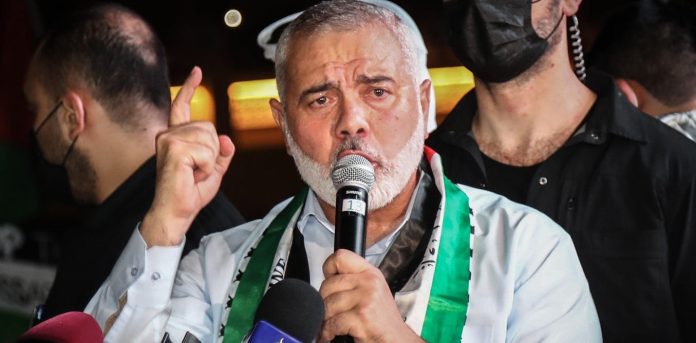Killing of Hamas leader Ismail Haniyeh: what does it mean for the Gaza peace process?
The killing of Hamas political chief, Ismail Haniyeh, in an airstrike is likely to mean ceasefire negotiations in Gaza will be put on hold.
Haniyeh, who was in Tehran, Iran, to attend the inauguration ceremony of Iran’s president Masoud Pezeshkian, was a key player in the peace talks. It’s not clear how or when the peace talks, which were already fraught with major challenges and tensions, will be able to resume.
Though Israel has made no comment, numerous countries, including Iran and Turkey blamed Israel directly, while Russia and Qatar condemned the attack. Middle East experts immediately voiced fears that the conflict could escalate and become a larger regional conflict.
Last week, Israel confirmed that it had carried out a strike in Beirut, Lebanon, assassinating Hezbollah’s senior military commander Fu’ad Shukr in retaliation for the deadly attack that had taken place in the Israel-occupied Golan Heights. Somewhat surprisingly, Israel has not confirmed the attack on Haniyeh in Iran.
Who was Haniyeh?
Haniyeh was widely considered the primary leader of Hamas since 2017 and was the chief negotiator for Hamas for the Qatari-brokered ceasefire deal with Israel that would include an exchange of hostages held in Gaza for Palestinians held in Israeli prisons, along with more aid for Gaza.
Haniyeh was appointed Palestinian prime minister in 2006 by Palestinian president Mahmoud Abbas, the year that Hamas won the most seats in the Palestinian elections. However, the violence in the Gaza Strip between Fatah and Hamas that followed left eight people dead, leading to a deep rift between the two organisations.
The rift worsened after Hamas accused Fatah of trying to assassinate Haniyeh in 2008 using a suicide bomber – something that Fatah denied.
Though Haniyeh was known for using tough rhetoric, he was considered moderate by Hamas standards, and a pragmatist who wanted to broker a ceasefire.
Hanieyeh was an early advocate of Hamas engaging in the political arena, and in the last few months he had been involved in shuttle diplomacy between the different camps.
Hamas’s military wing is more radical and extreme than Haniyeh, with a vested interest in the war continuing indefinitely. And yet it was Haniyeh who was assassinated, not the military commander of Hamas, Yahya Sinwar.
There are suggestions that Netanyahu’s government is involved, but it also could have been the action of a spoiler, (breakaway movements or individuals), which engage in acts of violence to sabotage the peace process. These could aim to get Iran further involved in the war, since the assassination took place on its territory.
Not only is it unlikely that Iran would allow an attack on its own soil to go unanswered, but this also diminishes the chances of a breakthrough in the hostage deal. Many attempts at making peace in the Middle East have been complicated by the actions of spoilers. And these emerging negotiations may have threatened their interests.
The brazen and horrific attack by Hamas on Israel on October 7 was in part a reaction to Israel normalising relations with the United Arab Emirates and Bahrain via the Abraham Accords (signed in 2020). Israel was also moving towards a better relationship with Saudi Arabia. Haniyeh remarked at the time: “All the agreements of normalisation that you [Arab states] signed with [Israel] will not end this conflict.”
There have been various attempts to undermine peace reconciliation efforts, such as when Israeli prime minister Yitzhak Rabin was assassinated in 1995 by an Israeli extremist opposed to the Oslo Accords. This was followed by a string of suicide attacks by Hamas with a similar aim of disrupting the peace deal.
In some ways Hamas has been strengthened by the conflict because it has managed to isolate Israel from much of the world, knowing that Israel would respond with a preponderance of force, killing almost 40,000 people.
Hamas’s military wing prefers that the conflict widens, while Haniyeh was working towards an end to the violence.
Haniyeh certainly suffered for the Hamas attack on October 7. Though he denied that any of his 13 children were militants, his family was targeted by Israel. Three of his sons and four grandchildren were killed in Israeli airstrikes.
It’s not clear how much Haniyeh even knew about the October 7 Hamas attack on Israel. Reportedly the plan was drawn up by the Hamas military council in Gaza and was a closely guarded secret, even surprising some Hamas officials.
It’s also not clear that Iran was consulted about the attack or even knew of the October 7 plan. Iran had stated that it would not support Hamas unless it was given notice. This assassination changes Iran’s calculus. Iranian state television boasted that “retaliation” was coming.
If Israel was behind this attack, this is a morale boost for the Israeli military and Netanyahu supporters, and also a blow to Iran, as it was caught off guard. Though Netanyahu ordered his cabinet not to comment, one Israeli cabinet member celebrated Haniyeh’s death on social media.
If Israel was responsible, it is doubling down on efforts to push the crisis to the brink – and taking a huge gamble. Though there are many unanswered questions about who and why this attack took place, it’s clear that this conflict is entering a frightening stage, and could trigger an all-out war in the Middle East.![]()
Natasha Lindstaedt, Professor, Department of Government, University of Essex
This article is republished from The Conversation under a Creative Commons license. Read the original article.



